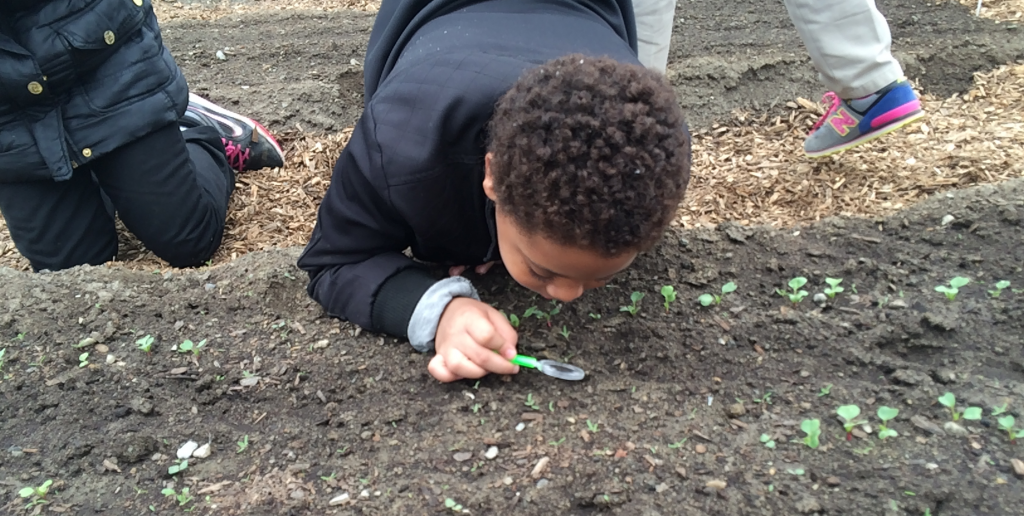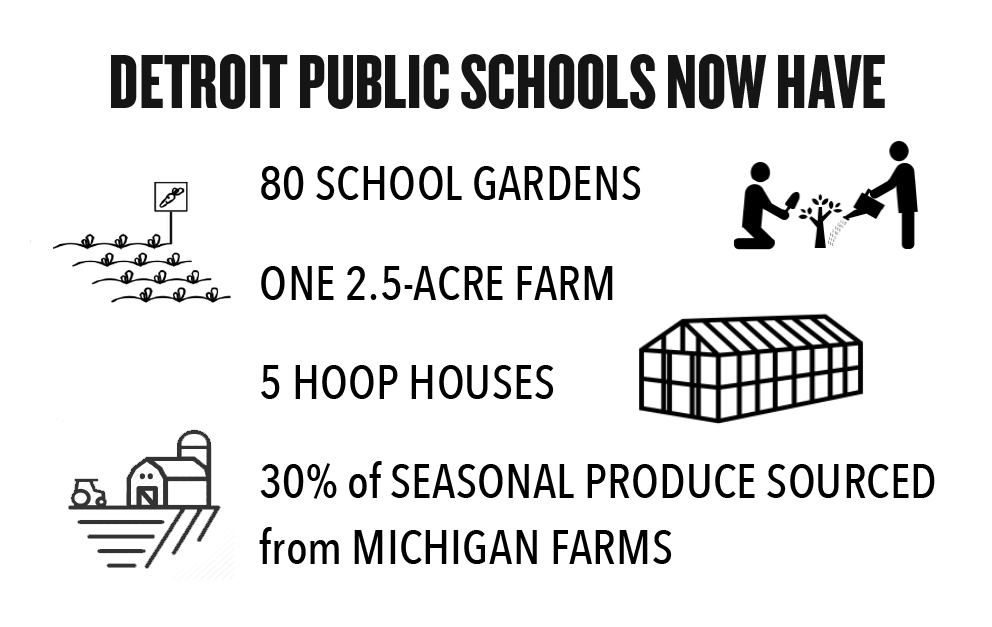Betti Wiggins
Detroit’s Rebel Lunch Lady
 TITLE: Executive Director of Child Nutrition Programs for Detroit Public Schools
TITLE: Executive Director of Child Nutrition Programs for Detroit Public Schools
LOCATION: Detroit, Michigan
IMPACT: Feeding 50,000 students with healthy, farm fresh foods each day, shaking up the learning environment and boosting local farms with school food dollars!
Though you may not know her name, in the farm to school world, Betti Wiggins is a rock-star. Her journey as “Detroit’s Rebel Lunch Lady” started in 2009, when a string of federal reports warned that childhood obesity rates were reaching epidemic levels. Her home city of Detroit was named one of the most obese. As a longtime school food service professional, she was determined to change that. In the process, she’s made Detroit one of the nation’s farm-to-school leaders.
Betti knew Detroit’s high obesity rates were preventable, so she started poring over resources available through the Healthy and Hunger Free Kids Act of 2010, the most recent version of the federal Child Nutrition Act reauthorized by Congress every five years. The bill “gave me the guidance I needed to start a farm to school program that could be paid for using my school food service account,” she says. Betti discovered there was federal funding available to purchase local produce for school meals and supplies like seeds and gardening tools.

A student at Detroit Public Schools takes a closer look at soil life during a lesson out in the field, as part of a farm to school curriculum.
At a time when urban agriculture was taking off in Detroit, she repurposed some of the city’s 141 vacant lots into school farms and gardens. “We started the Detroit School Garden Collaborative, not just with public schools but for charter schools, Catholic schools, and even daycare centers.” These efforts improved access to fresh fruits and vegetables and also supported STEM (Science, Technology, Engineering, & Math) education through hands-on learning in the garden and curricula that emphasize food, nutrition and farming.

Now in its fifth year, Betti’s program can be felt in all corners of the community. The recent National Farm to School Census offers evidence of farm to school benefits like job creation. Betti sees these results firsthand when local farmers – whom Betti calls “the most courageous small business owners” – are able to hire new staff because schools pay a competitive price for local produce. Her students are eating Michigan grown food, learning about agriculture and plants and growing vegetables themselves. The lunchroom is more dynamic, for example schools have gone beyond iceberg lettuce, using their own mix of more nutritious baby spinach, brassica and kales instead. And parents are getting involved at their kids’ urging, joining in to learn about gardening and help with the harvest.
Betti’s work is so impressive that she was brought before Congress to testify in support of stronger school nutrition efforts and was profiled by PBS’ Food Forward!

Betti’s advice for school administrators looking to shake up their schools:
Money Matters
- Seek funding through the Healthy, Hunger-Free Kids Act of 2010 for school gardens & local food buying.
- Look for ways to generate income and lower your program’s dependence on grants. For example, Betti’s school garden program started selling their own produce!
- Does your school qualify for the Community Eligibility Provision? If so, you can provide free breakfast and lunch to all students with federal support.
- Consider a small increase in lunch prices (Betti suggests 50 cents) to support local food purchases.
Work with Local Farmers
- Look for a distributor who engages local farmers and will deliver food that needs minimal processing.
- See if your farmer can get GAP (Good Agricultural Practices) certified. They might need to take classes about handling and liability, but it will open up new market opportunities for their farm.
- Don’t stop at produce. See if you can find local ranchers, bakers and processors for sourcing.
Bring in Educational Benefits
- Develop a curriculum with your science department. Their budget can even help with buying seeds and provide support for the school garden or field trip elements of a farm to school program.
- Don’t expect teachers to know everything. Betti holds monthly seminars with experts who educate teachers about agriculture, gardens and food systems.
- Don’t rely on volunteers for your school gardens. Betti hired part-time seasonal staff as official employees of the school lunch program, paid for by the school food service account.
- Talk to the school board. You voted for them; now get them to support your ambitions.
Resources for School Administrators
The Lunch Box
Farm to School Field Guide
Healthy Hunger-Free Kids Act of 2010
Discover funding opportunities available in your school.
Cornell University Food Service
Great list of resources for Food Service professionals.
Click here to see a complete list of Farm to School resources.



